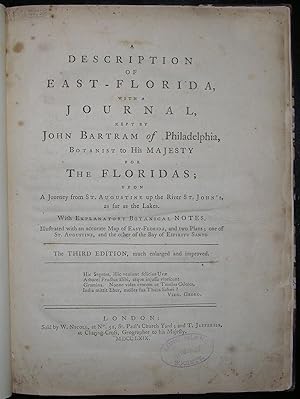Descripción
2 parts in one volume. 4to., (10 6/8 x 8 inches). Three folding engraved maps of St. Augustine, East Florida (expertly laid down on archival tissue), and Espirito Santo Bay (title-pages a bit frayed at the edges, some occasional spotting). Half modern calf antique (extremities a bit scuffed). Provenance: With the ink library stamps of the Long Island Historical Society at the foot of the title-page and last leaf of text. Third edition of Stork's account, second edition of celebrated botanist John Bartram's "Journal.": "Bartram's scientific and commercial endeavors flourished in the 1750s and 1760s, his botanical supply business providing the income and incentive to enable him to travel ever wider in search of new specimens. In 1765, the aging Bartram set sail from Philadelphia to join his son, William, in Charleston to begin a botanical and scientific survey of the South. From Charleston, they traveled overland to Saint Augustine and Fort Picolata on the Saint John's River, and from there, by canoe and foot throughout the extensive drainage basin. Like many natural histories, Stork's tract is part promotional, part natural historical. A knowledge of flora and fauna was essential for successful -- and profitable -- settlement, and writers and land owners stood to profit personally from an increase in interest. Adding to a promising description of Saint Augustine, and chapters on the climate, soil, and animal and plant life, Stork included bullish tracts on the potential in Florida for the cultivation of rice, cotton, silk, sugar, indigo, and other profitable crops. On the same latitude as the productive English colonies in Bengal and China, the warm climate of Florida made silk culture particularly likely, whereas in "Carolina and Georgia the worms are often injured by accidental frosts" (American Philosophical Library online). Clark 1:195; Cumming 379; De Renne I. p. 193; Howes S1042; Sabin 92222; Servies 480; Vail 600. Catalogued by Kate Hunter. N° de ref. del artículo 002402
Contactar al vendedor
Denunciar este artículo
![]()




